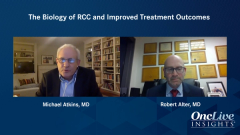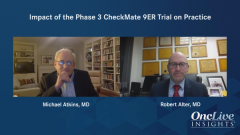
The Role of VEGF TKI Monotherapy
Episodes in this series

Michael Atkins, MD: A lot of people have asked, “What is the role of single-agent VEGF receptor TKIs [tyrosine kinase inhibitors] now that we have these 2 doublets? Which is the standard of care in the frontline treatment setting? Are there any patients who should get sunitinib or pazopanib or cabozantinib in the frontline treatment setting?” For me, the answer is very few patients. It would be the patients who can’t get immunotherapy because they have a serious autoimmune condition that, if exacerbated, could cause problems. Or it could be that this leaves them on an immunosuppressive drug that would interfere with the activity of the immunotherapy. It could also be patients who are on steroids either because of brain metastases or spinal cord compression or patients who are in the hospital where you need to get them out of the hospital. These are all patients for whom a single-agent TKI might make sense as an initial treatment, and it could potentially be the only treatment depending on whether it’s safe at any point in the future to give them immunotherapy.
Robert Alter, MD: We’re still going to have the winter upon us, so there may be a travel restriction as well. Even for those patients, if they’re on a TKI, you still have to monitor these patients closely with toxicity. We haven’t even talked about the avelumab-axitinib arm, and those data are very good. The overall survival [OS] is not mature, so we cannot pass judgment. When we talked about those 3 treatments, we always thought that was the third that came to the party, and there’s no OS data as of yet. That should probably come out within the next year or so, and we’ll have to see how that plays out. We’ll be following the slope to see where that takes us.
Michael Atkins, MD: You’re talking about the axitinib-avelumab arm?
Robert Alter, MD: Right.
Michael Atkins, MD: Unfortunately, I don’t think we’ll ever have overall survival benefit. As we’ve seen with the axitinib-pembrolizumab data, the hazard ratio for overall survival was 0.53 when the data were first reported, and it has gone up to 0.68 with longer follow-up. That’s not because axitinib-pembrolizumab doesn’t work as well over time in the next group of patients. The patients on the sunitinib arm with less aggressive disease are progressing, but they are able to receive a second-line nivolumab and get some benefit from that. Therefore, the dramatic difference that we’re seeing early on in patients alive between the 2 treatment arms tends to be attenuated over time.
Transcript Edited for Clarity













































